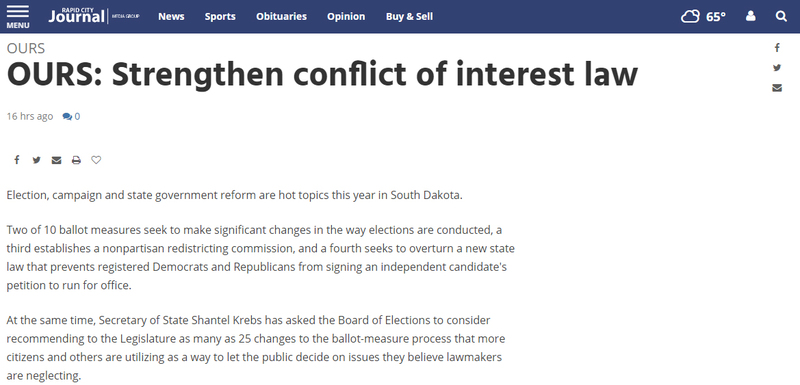Election, campaign and state government reform are hot topics this year in South Dakota.
Two of 10 ballot measures seek to make significant changes in the way elections are conducted, a third establishes a nonpartisan redistricting commission, and a fourth seeks to overturn a new state law that prevents registered Democrats and Republicans from signing an independent candidate's petition to run for office.
At the same time, Secretary of State Shantel Krebs has asked the Board of Elections to consider recommending to the Legislature as many as 25 changes to the ballot-measure process that more citizens and others are utilizing as a way to let the public decide on issues they believe lawmakers are neglecting.
Lawmakers themselves have taken steps to address concerns by passing a conflict-of-interest law in the last session that arose after extensive media coverage of the EB-5 and Gear-Up scandals that raised questions about executive-branch accountability and played a role in two suicides and a mass murder.
Now, Attorney General Marty Jackley is asking state lawmakers to put real teeth in this new law as the public waits to see if state government is serious about policing those who oversee state contracts and public funds.
In a letter to legislators, the attorney general asks that any direct conflicts of interest and reports of theft and fraud be reported to his office. Now, they can be reported to either the office of auditor general, who is employed by the Legislature, or the attorney general.
Jackley also asked that serious violations be treated as felonies that could lead to prison sentences rather than misdemeanor crimes where it is presumed the punishment is probation.
As state law now stands, it appears that lawmakers and state officials are above the law the rest of us are required to follow. It seems unfathomable that if a state employee or lawmaker is suspected of theft or fraud it is not reported to law enforcement but rather to an office that reports to the Legislature.
Also, state officials and lawmakers should face the same penalties as any citizen for theft and fraud. It reeks of protectionism to suggest that crimes involving public officials mishandling public funds can only be misdemeanors while those who steal from government can be sent to prison.
Now some may say that since Jackley is considering a run for governor in 2018 these requests are motivated by politics. Whether that is the case or not is immaterial if the request has merit, which it does in this case. The Legislature should make these changes to the conflict-of-interest law in the next session.
If not, questions will continue to linger about lawmakers’ commitment to transparency and accountability, which has put a spotlight on the state capitol. To leave the law as it now stands will only foster more of the mistrust that many now feel toward all levels of government.
Mentions
States
- South Dakota
Securities Disclaimer
This website is for informational purposes only and does not constitute an offer or solicitation to sell shares or securities. Any such offer or solicitation will be made only by means of an investment's confidential Offering Memorandum and in accordance with the terms of all applicable securities and other laws. This website does not constitute or form part of, and should not be construed as, any offer for sale or subscription of, or any invitation to offer to buy or subscribe for, any securities, nor should it or any part of it form the basis of, or be relied on in any connection with, any contract or commitment whatsoever. EB5Projects.com LLC and its affiliates expressly disclaim any and all responsibility for any direct or consequential loss or damage of any kind whatsoever arising directly or indirectly from: (i) reliance on any information contained in the website, (ii) any error, omission or inaccuracy in any such information or (iii) any action resulting therefrom.




